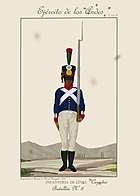Afro-Chileans
Afro-Chileans are citizens of Chile, primarily descended from Africans who were brought to the New World with the arrival of the Spaniards toward the end of the slave trade.
| Total population | |
|---|---|
| Unknown | |
| Regions with significant populations | |
| Arica, Camarones | |
| Languages | |
| Spanish | |
| Religion | |
| Roman Catholicism | |
| Related ethnic groups | |
| Africans · Afro-Latin Americans · Afro-Caribbeans · Afro-Hispanics |
History
Afro-Peruvian soldier-settlers in Valdivia
Once Spanish presence in Valdivia was reestablished in 1645, authorities had convicts from all-over the Viceroyalty of Peru construct the Valdivian Fort System.[1] The convicts, many of whom were Afro-Peruvians, became soldier-settlers once they had served their term.[1] Close contacts with indigenous Mapuche meant many soldiers were bilingual in Spanish and Mapudungun.[2] A 1749 census in Valdivia shows that Afro-descendants had a strong presence in the area.[1]
War of Independence

A specific group of blacks in Chilean history are the members of the 8th Regiment of the Army of the Andes that fought the Spaniards in Chacabuco. That was the army organized by the United Provinces of the Río de la Plata and led by José de San Martín to liberate Chile and later allow the liberation of Peru. San Martín demanded black slaves as contribution to the Army of the Andes by the Mendoza landowners, because in his opinion blacks were the only people capable of participating in the infantry component of the army, and included them in the forces commanded later by Bernardo O'Higgins. They were included in the Army of the Andes and received their freedom after the crossing of the Andes and the fight against the Spaniards. As members of the infantry they were exposed to higher risks during battle. This episode of the history of Chile is very seldom mentioned and the group of blacks has never received any recognition for their contribution to the liberation of Chile.[3]
The African minority that lived mainly in Santiago, Quillota and Valparaíso began to mix with gypsies, and Europeans, shaping a whole new ethnic and cultural identity for Chile.[4]
Ban of slavery
Chile banned slavery in 1811 through the "Liberty of womb" law made by Manuel de Salas, seven years after he had read the following announcement in a newspaper: "For sale: 22 to 24-year-old mulatto, nice condition, good price." Thanks to this ban, dictated in 1823,[5] Chile became the second country in the Americas to prohibit slavery, after Haiti.
Despite the gradual emancipation of most black slaves in Chile, slavery continued along the Pacific coast of South America throughout the 19th century, as Peruvian slave traders kidnapped Polynesians, primarily from the Marquesas Islands and Easter Island, and forced them to perform physical labour in mines and in the guano industry of Peru and Chile.
Annexation of Arica
Finally, there was one more event that added the African inheritance to the Chilean blood. When the city of Arica was finally integrated to Chile, in 1929, a lot of Afro-descendants began living under the Chilean law. They are part of the "Black Arica", and they work daily to promote their traditions and culture, proving that their influence goes beyond the "cueca" or "zamacueca".[6]
Notable Afro-Chileans
- Occupé Bayenga, footballer (Congolese naturalized Chilean)
- Jean Beausejour, footballer (Haitian father)
- Pedro Campos, footballer (Cuban father)
- Junior Fernandes, footballer (Afro-Brazilian parents)
- César Munder, footballer (Cuban naturalized Chilean)
- Marta Salgado, activist for Afro-Chilean rights
- Lawrence Vigouroux, footballer (Jamaican mother)
Afro-Chileans in fiction
- Gustavo Fring, Breaking Bad and Better Call Saul television series
External links
References
- "Historia". Museo de Sitio Castillo de Niebla (in Spanish). Servicio Nacional del Patrimonio Cultural. Retrieved 7 April 2020.
- Urbina C., María Ximena (2017). "La expedición de John Narborough a Chile, 1670: Defensa de Valdivia, rumeros de indios, informaciones de los prisioneros y la creencia en la Ciudad de los Césares" [John Narborough expedition to Chile, 1670: Defense of Valdivia, indian rumours, information on prisoners, and the belief in the City of the Césares]. Magallania. 45 (2). doi:10.4067/S0718-22442017000200011. Retrieved 27 December 2019.
- Barros Arana, Diego (1999). Historia General de Chile: La Colonia, de 1610 a 1700 [General History of Chile: The Colony from 1610 to 1700] (PDF) (in Spanish). 5. University of Santiago de Chile Research Centre. ISBN 956-11-1550-6. Retrieved 11 October 2016.
- "El folclor musical de Chile y sus tres grandes raíces - Africana". www.memoriachilena.gob.cl. 2020. Retrieved 21 June 2020.
- "The Antislavery Movement". The Columbia Electronic Encyclopedia (6th ed.). Columbia University Press. 2012. Retrieved 11 October 2016.
- Rioseco, Virginia. "Oro Negro Foundation:Afro descendants organize themselves". nuestro.cl. Archived from the original on 1 February 2015.